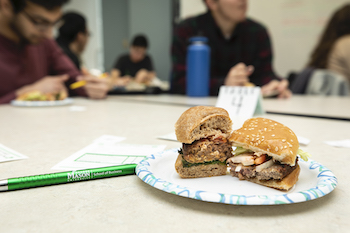
From left, Adam David and Laura Todd prepare to taste plant-based burgers at a taste-test organized by the Center for Innovation and Entrepreneurship at the School of Business. Photo by Ron Aira/Creative Services.
For the foodies, it’s the same as what Ali-Frazier was to boxing or what Duke and North Carolina are to college basketball enthusiasts.
It’s the Grand Daddy of them all, a highly anticipated matchup of the field’s blue bloods with top billing and all the requisite bragging rights at stake.
Impossible Burger versus Beyond Burger may not garner the national headlines of the others, but it’s relevance in anointing the best in that particular culinary field is just as real.
And that battle played out Feb. 18 in George Mason University’s Enterprise Hall, during a lunchtime plant-based hamburger taste-test. Sponsored by the School of Business’ Center for Innovation and Entrepreneurship (CIE), the taste-test drew 45 Mason students and staff.

The Center for Innovation and Entrepreneurship at the School of Business organized a taste test of plant-based burgers. Photo by Ron Aira/Creative Services.
“This is the kind of event that people are just excited to participate in,” said the center’s program manager Rebecca Howick. “They are excited for an opportunity to try something new and, at the same time, get free food.”
The CIE is an interdisciplinary hub that supports innovators from all Mason schools and programs. In addition, it emphasizes the importance of experiential learning opportunities to complement and expand traditional academic offerings. The center is also focused on strengthening the regional innovation ecosystem, said Executive Director David J. Miller.
This is the fourth semester for the informal taste-test, which highlights the innovation trends in the food and beverage field. During the event, Miller and the attendants discussed how health and environmental concerns drive food preferences, the opportunities available in the food and beverage innovation space and the changes in distribution of plant-based products in recent years.
Mason students and employees received small portions of Burger King’s Impossible Whopper and the Beyond Burger from Whole Foods Market. (Participants also got a bonus serving of Dunkin Donuts’ Beyond Sausage Sandwich.) Burger King’s Impossible Whopper contains soy and potato protein, while the Beyond Burger’s main sources of protein are peas, mung beans and brown rice.
Before filling out their score cards, participants discussed texture, taste and caloric content, along with their concerns about the availability of meat substitutes on campus.
Adam David, a freshman computer science major, preferred the Impossible Burger, declaring the Beyond Burger “a little stringy.” Apparently, other participants agreed, because when the results were tallied, Burger King’s Impossible Whopper won by a landslide, with 94% of the votes.
But Mason employee Stevie Kelly pondered whether the results were skewed because the Burger King’s Impossible Whopper was topped with onion, ketchup, mayonnaise and the option of cheese.
Laura Todd said the Impossible Whopper was tastier, and “resembles eating a real burger.”
Todd, a Mason employee who is also pursuing an information technology certificate, added that she was interested in alternatives to meat because “if I can still have my burgers and not contribute to the planet melting faster, that’s good.”
In the end, said Miller, “I hope people who came got a chance to experiment a little and meet new people. Networking is also an important part of entrepreneurship.”
